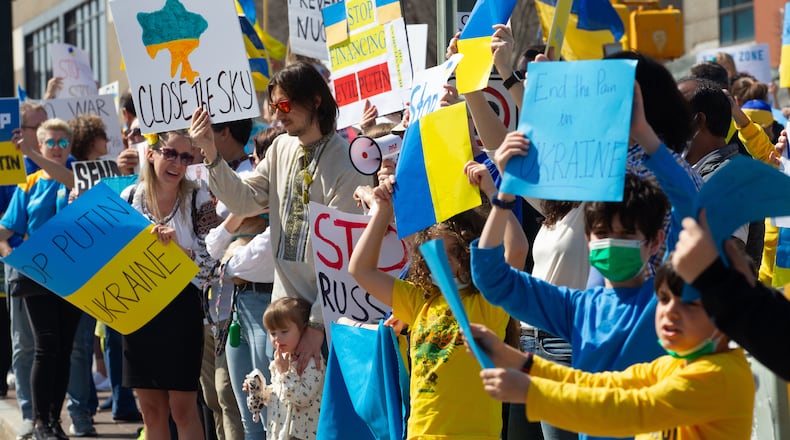Coca-Cola has joined the exodus of Western corporations pulling out of the Russian market.
In a statement published on its website Tuesday afternoon, the Atlanta-based beverage giant announced it was suspending its business in Russia.
“Our hearts are with the people who are enduring unconscionable effects from these tragic events in Ukraine,” the statement read. “We will continue to monitor and assess the situation as circumstances evolve.”
Since the start of Russia’s full-scale assault on Ukraine, a growing number of corporations had put their Russian operations on hold, a sign of the economic confrontation taking place alongside military battles on the ground.
In recent days, Atlanta’s Ukrainian community organized to pressure Coke into joining the Russian withdrawal. Russia represents roughly 1.5% of Coke’s global beverage sales volume, based on the company’s 2020 annual report.
On Saturday, some three dozen people peeled off from a large pro-Ukraine rally downtown to protest Coke outside the World of Coca-Cola museum, where they criticized the Atlanta-based company’s response to the conflict, leading chants of “Stop business in Russia” and “Shame on Coca-Cola.”
Coke “needs to stop contributing to Russian taxes, to their revenues, to their economy. They need to pull out,” said Irina Levterova Bhatia, a Ukrainian immigrant and Saturday rally-goer. “This is their chance to pick the right side of history.”
Pressuring Coke, according to Levterova Bhatia, is a way for Atlanta’s Ukrainian diaspora to make themselves useful.
“The beverage company is headquartered here. Atlanta is not a large, global city. We’re not London or Berlin. Our protest may be smaller, but we would like to make our opinions known where it matters.”
Asked for a comment Monday morning, Coke had not responded to the AJC’s request by 5 p.m Tuesday.
In a statement published on its website last week announcing a financial contribution to the Red Cross, Coca-Cola noted that its “focus is on our people and supporting humanitarian relief efforts in Ukraine and the region.”
Although most U.S. food companies and fast-food chains were slower to respond to the Ukraine crisis, the tide has started to change, as pressure from activists and consumers grew.
Also on Tuesday, McDonald’s said it would temporarily close all of its 850 fast-food restaurants in Russia, and coffee giant Starbucks said it is suspending all business activity in the country. U.K.-based Unilever, whose brands include Dove soap and Ben & Jerry’s ice cream, announced it was suspending Russian imports and exports.
PepsiCo, Coke’s chief drinks rival, also announced its pullout from the county on Tuesday.
In a letter sent by email from CEO Ramon Laguarta to PepsiCo associates, he wrote, “As many of you know, we have been operating in Russia for more than 60 years, and we have a place in many Russian homes. Pepsi-Cola entered the market at the height of the Cold War and helped create common ground between the United States and the Soviet Union. However, given the horrific events occurring in Ukraine we are announcing the suspension of the sale of Pepsi-Cola, and our global beverage brands in Russia, including 7Up and Mirinda. We will also be suspending capital investments and all advertising and promotional activities in Russia.”
McDonald’s said it will continue paying its 62,000 employees in Russia “who have poured their heart and soul into our McDonald’s brand.” But in an open letter to employees, McDonald’s CEO Chris Kempckinski said closing those stores for now is the right thing to do.
“Our values mean we cannot ignore the needless human suffering unfolding in Ukraine,” Kempczinski said.
Kempczinski said it’s impossible to know when the company will be able to reopen its stores.
Max Poliashenko is a Ukrainian immigrant from Kharkiv, a city near the Russian border that suffered heavy bombardment since the conflict’s outbreak. On phone calls with relatives back home, he sometimes hears the sounds of explosions. At this time, he says the West’s swift impositions of financial penalties is among his only sources of hope.
“That’s the way to stop Putin and turn Russian public opinion against him.”
In Georgia, Atlanta-based Delta Air Lines earlier suspended its partnership with Russian national airline Aeroflot, and Sandy Springs-based UPS has halted shipments to Russia.
The Associated Press contributed to this report.
Lautaro Grinspan is a Report for America corps member covering metro Atlanta’s immigrant communities.
About the Author
Keep Reading
The Latest
Featured



